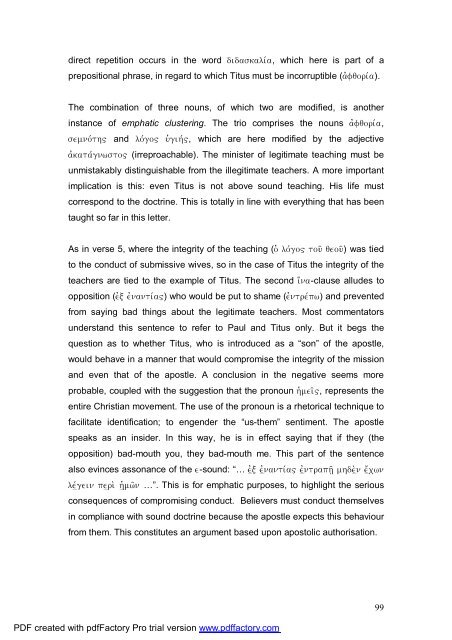A Text centred rhetorical analysis of Paul's Letter to Titus
A Text centred rhetorical analysis of Paul's Letter to Titus
A Text centred rhetorical analysis of Paul's Letter to Titus
Create successful ePaper yourself
Turn your PDF publications into a flip-book with our unique Google optimized e-Paper software.
direct repetition occurs in the word didaskaliva, which here is part <strong>of</strong> a<br />
prepositional phrase, in regard <strong>to</strong> which <strong>Titus</strong> must be incorruptible (ajfqoriva).<br />
The combination <strong>of</strong> three nouns, <strong>of</strong> which two are modified, is another<br />
instance <strong>of</strong> emphatic clustering. The trio comprises the nouns ajfqoriva,<br />
semnovth~ and lovgo~ uJgihv~, which are here modified by the adjective<br />
ajkatavgnws<strong>to</strong>~ (irreproachable). The minister <strong>of</strong> legitimate teaching must be<br />
unmistakably distinguishable from the illegitimate teachers. A more important<br />
implication is this: even <strong>Titus</strong> is not above sound teaching. His life must<br />
correspond <strong>to</strong> the doctrine. This is <strong>to</strong>tally in line with everything that has been<br />
taught so far in this letter.<br />
As in verse 5, where the integrity <strong>of</strong> the teaching (oJ lovgo" <strong>to</strong>u` qeou`) was tied<br />
<strong>to</strong> the conduct <strong>of</strong> submissive wives, so in the case <strong>of</strong> <strong>Titus</strong> the integrity <strong>of</strong> the<br />
teachers are tied <strong>to</strong> the example <strong>of</strong> <strong>Titus</strong>. The second i{na-clause alludes <strong>to</strong><br />
opposition (ejx ejnantiva") who would be put <strong>to</strong> shame (ejntrevpw) and prevented<br />
from saying bad things about the legitimate teachers. Most commenta<strong>to</strong>rs<br />
understand this sentence <strong>to</strong> refer <strong>to</strong> Paul and <strong>Titus</strong> only. But it begs the<br />
question as <strong>to</strong> whether <strong>Titus</strong>, who is introduced as a “son” <strong>of</strong> the apostle,<br />
would behave in a manner that would compromise the integrity <strong>of</strong> the mission<br />
and even that <strong>of</strong> the apostle. A conclusion in the negative seems more<br />
probable, coupled with the suggestion that the pronoun hJmei`~, represents the<br />
entire Christian movement. The use <strong>of</strong> the pronoun is a <strong>rhe<strong>to</strong>rical</strong> technique <strong>to</strong><br />
facilitate identification; <strong>to</strong> engender the “us-them” sentiment. The apostle<br />
speaks as an insider. In this way, he is in effect saying that if they (the<br />
opposition) bad-mouth you, they bad-mouth me. This part <strong>of</strong> the sentence<br />
also evinces assonance <strong>of</strong> the e-sound: “… ejx ejnantiva" ejntraph`/ mhde;n e[cwn<br />
levgein peri; hJmw`n …”. This is for emphatic purposes, <strong>to</strong> highlight the serious<br />
consequences <strong>of</strong> compromising conduct. Believers must conduct themselves<br />
in compliance with sound doctrine because the apostle expects this behaviour<br />
from them. This constitutes an argument based upon apos<strong>to</strong>lic authorisation.<br />
PDF created with pdfFac<strong>to</strong>ry Pro trial version www.pdffac<strong>to</strong>ry.com<br />
99

















